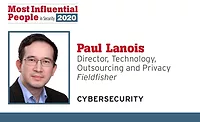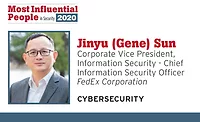Cybersecurity
Security's Most Influential People in Security 2020 - Joyce Hunter
Executive Director, The Institute for Critical Infrastructure Technology

Joyce Hunter is the Executive Director of the Institute for Critical Infrastructure Technology (ICIT), a nonprofit cybersecurity and technology think tank. There, she is responsible for building and executing ICIT's mission of improving national security, increasing public and private sector cyber resiliency, and modernizing critical infrastructures.
U.S. President Barack Obama appointed Hunter as the deputy chief information officer for Policy and Planning at the Department of Agriculture (2013-2017) and as the acting chief information officer from March 2016 to July 2016. An MBA holder from the Wharton School of Business, Hunter is a strategic-doer who oversaw the Department’s IT investment portfolio of $4.1 billion and provided executive leadership in IT governance, portfolio management, IT policy, workforce planning and enterprise architecture.
With more than 30 years’ experience in the information technology industry, Hunter demonstrates a strong ability to build and sustain relationships with public and private stakeholders, and to develop and lead innovative projects and inter-agency initiatives. Prior to her federal appointment, Hunter was the CEO of Vulcan Enterprises, a strategic management consulting organization, where she also provides executive coaching and IT advisory services.
Hunter has been honored numerous times as a technology executive, receiving the Joseph A. Wharton award and the Roy L. Clay Sr. Technology Pinnacle Award for being one of the 50 most important African-Americans in technology. She is on the Dean’s Advisory Council for Villanova University, sits on multiple industry boards and is active in several philanthropies focused on advancing STEM and data science education. She is also published in The Handbook of Federal Government Leadership and Administration: Transforming, Performing and Innovating in a Complex World.
She is passionate about advancing a digital future. She says, “It’s a significant issue for educators, cyber experts and our future cyber leaders. The rapidly evolving challenges are what makes it such an exciting time to work in our fields of data protection and cybersecurity. Cybersecurity professionals have never been in more demand, and training and capabilities are essential. By understanding the information lifecycle, from collection to storage, to destruction; by taking a privacy and security and testing by design approach; and recognizing the human element in how we interact with data, future cyber leaders will be well equipped to help take us into a safe and people-centered digital future.”
Hunter is most proud of the creation of the Data Science Camp in 2014 while she was the Deputy CIO for Policy and Planning at USDA for underserved and underpresented youth. “Science Technology Engineering Agriculture and Math (STEAM) has just completed its sixth year and is designed to deliver an immersive, two-week-long, design thinking, project-based and team-focused learning experience for high school students. The program’s goal is to help these students build familiarity and hands-on competence with the approaches, tools and analytical techniques relevant to harnessing the power of open data on critical issues related to food and agriculture in the Washington, D.C. and Sacramento, Calif. areas,” she says. There are additional camps forthcoming with concentrations in energy, athletics and architecture.
Looking for a reprint of this article?
From high-res PDFs to custom plaques, order your copy today!






